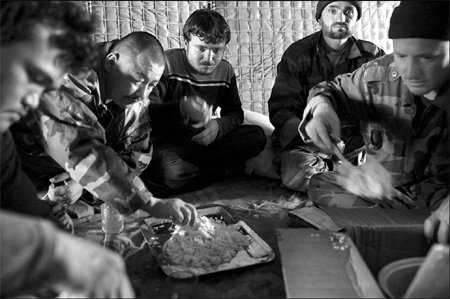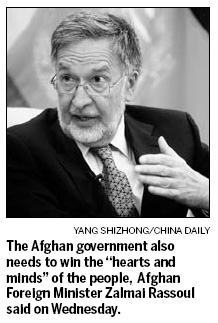Global General
Afghanistan will continue to 'reach out' to insurgents
By Zhang Haizhou (China Daily)
Updated: 2010-03-25 06:57
 |
Large Medium Small |
Military solution alone would not resolve conflict, says foreign minister
|
 Afghan soldiers share a meal inside a bunker on Wednesday outside Marjah, where a major offensive against the Taliban continues. [Mauricio LIMA / Agence France-Presse] |
BEIJING - Afghanistan will continue to seek reconciliation with insurgent groups, except hard-core entities like the Al-Qaida, the country's foreign minister told China Daily on Wednesday.
"The military alone cannot be the solution to defeat terrorism," visiting Afghan Foreign Minister Zalmai Rassoul said, adding his government "needs to have a series of strategies" to combat terrorism in the war-torn nation.
Rassoul's comments came two days after "milestone" talks were held between Afghan President Hamid Karzai and a major insurgent group.
Along with fighting terrorists, the government also needs to "win the hearts and minds of the Afghan people," the 87-year-old said, adding Kabul would also need regional allies to "cooperate fully" in the fight against extremism.
"And, finally, a process of reconciliation (is needed) for those who are not part of Al-Qaida or (other hard-core) terrorist groups, (so that they will) be reintegrated under the framework of the Afghan constitution and peace process," Rassoul added.
Reaching out to insurgents has been a key part of the government's strategy since Karzai was re-elected late last year.
|
||||
The meeting, Reuters said, was an unprecedented success in Karzai's efforts and a "significant milestone". Previous contacts with insurgents had been furtive and conducted through mediators, mostly overseas.

Without elaborating on the achievements of that meeting, Rassoul said: "In our opinion, and in our contacts, we are amenable to a reintegration."
He said Kabul needed to provide security, economic development, and jobs to "reintegrate" insurgents "into the society under the framework of the Afghan constitution".
More than eight years since the war-on-terror has devastated the country, Rassoul said the government's priority was to achieve peace and stability.
But he also reiterated that the government was aiming at having more qualified Afghan security forces to protect the nation.
Late last year, United States President Barack Obama declared that he would send 30,000 more troops to the war-torn nation.
Nearly 90,000 international troops, over half of which are from the US, are now deployed in Afghanistan. They are backed by 97,200 personnel of the Afghan National Army, and 93,800 local police.
Labeling the recent surge in foreign troops as "a temporary one", Rassoul said part of the recently-added international forces were there to train Afghan national security forces.
"More of the Afghans are (becoming) trained security forces and the more they are involved in protecting Afghanistan, less and less there will be the need for foreign troops to stay in Afghanistan," he said, referring to the recent operation in Marjah district of Helmand Province in the southern part of the country.
"For the first time the Afghan security forces have been leading this operation, with a support role from the NATO and others," he said.
Afghan forces in mid-February launched an attack to seize Marjah, a major Taliban logistics and supply center and the largest community in the south under insurgent control.
Two weeks later, Kabul's forces raised the Afghan national flag over the town of 80,000.
Rassoul said it was a good beginning to the Marjah operation, but the "end result would be important to judge if it has been successful or not".
"I hope, in the longer term, peace and stability would come soon to Afghanistan. So, the moment there's peace and stability in Afghanistan, of course, there's not going to be need for foreign forces to be there in large numbers," he said.









